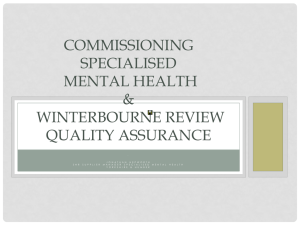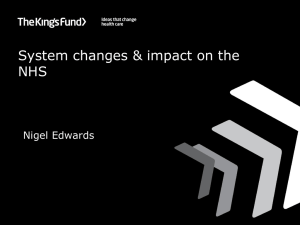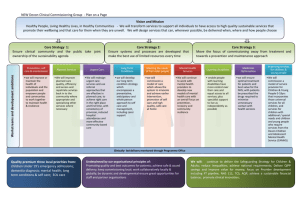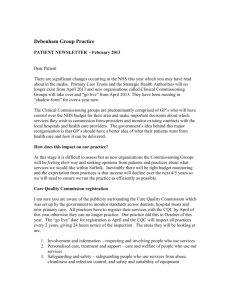C ommissioning What’s the big deal? What is commissioning?
advertisement
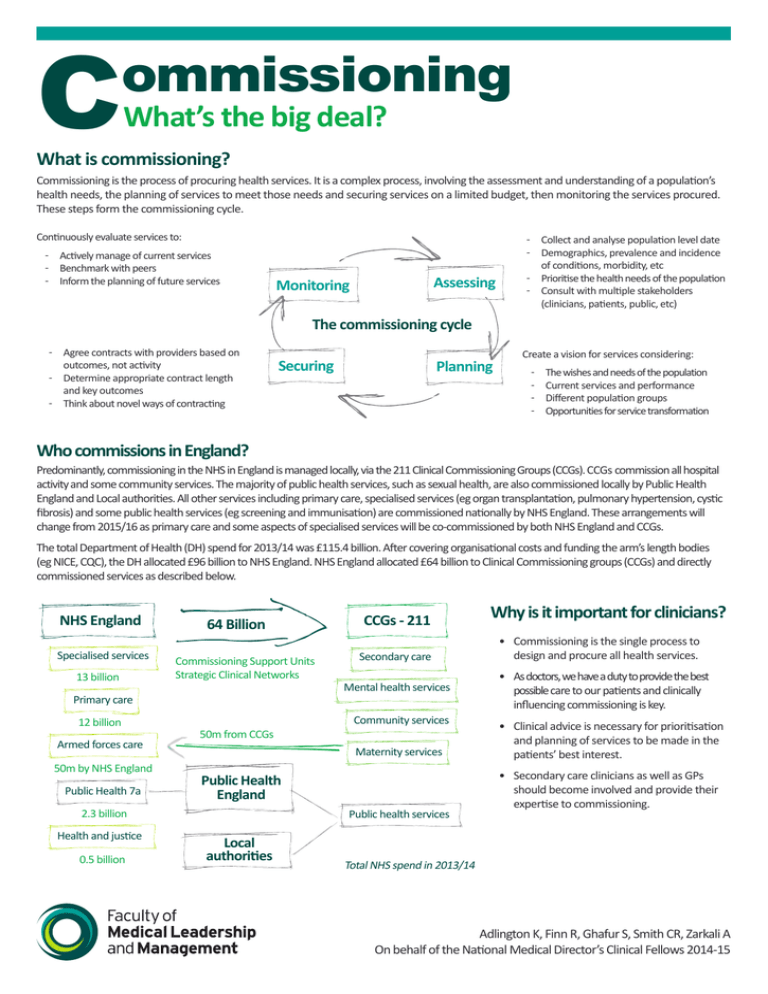
C ommissioning What’s the big deal? What is commissioning? Commissioning is the process of procuring health services. It is a complex process, involving the assessment and understanding of a population’s health needs, the planning of services to meet those needs and securing services on a limited budget, then monitoring the services procured. These steps form the commissioning cycle. Continuously evaluate services to: ͳͳ Actively manage of current services ͳͳ Benchmark with peers ͳͳ Inform the planning of future services Assessing Monitoring ͳͳ Collect and analyse population level date ͳͳ Demographics, prevalence and incidence of conditions, morbidity, etc ͳͳ Prioritise the health needs of the population ͳͳ Consult with multiple stakeholders (clinicians, patients, public, etc) The commissioning cycle ͳͳ Agree contracts with providers based on outcomes, not activity ͳͳ Determine appropriate contract length and key outcomes ͳͳ Think about novel ways of contracting Securing Planning Create a vision for services considering: ͳͳ ͳͳ ͳͳ ͳͳ The wishes and needs of the population Current services and performance Different population groups Opportunities for service transformation Who commissions in England? Predominantly, commissioning in the NHS in England is managed locally, via the 211 Clinical Commissioning Groups (CCGs). CCGs commission all hospital activity and some community services. The majority of public health services, such as sexual health, are also commissioned locally by Public Health England and Local authorities. All other services including primary care, specialised services (eg organ transplantation, pulmonary hypertension, cystic fibrosis) and some public health services (eg screening and immunisation) are commissioned nationally by NHS England. These arrangements will change from 2015/16 as primary care and some aspects of specialised services will be co-commissioned by both NHS England and CCGs. The total Department of Health (DH) spend for 2013/14 was £115.4 billion. After covering organisational costs and funding the arm’s length bodies (eg NICE, CQC), the DH allocated £96 billion to NHS England. NHS England allocated £64 billion to Clinical Commissioning groups (CCGs) and directly commissioned services as described below. NHS England Specialised services 13 billion 64 Billion Commissioning Support Units Strategic Clinical Networks Primary care 12 billion Armed forces care 50m by NHS England Public Health 7a 0.5 billion Secondary care Mental health services Community services 50m from CCGs Maternity services Public Health England 2.3 billion Health and justice CCGs - 211 Public health services Local authorities Why is it important for clinicians? • Commissioning is the single process to design and procure all health services. • As doctors, we have a duty to provide the best possible care to our patients and clinically influencing commissioning is key. • Clinical advice is necessary for prioritisation and planning of services to be made in the patients’ best interest. • Secondary care clinicians as well as GPs should become involved and provide their expertise to commissioning. Total NHS spend in 2013/14 Adlington K, Finn R, Ghafur S, Smith CR, Zarkali A On behalf of the National Medical Director’s Clinical Fellows 2014-15
